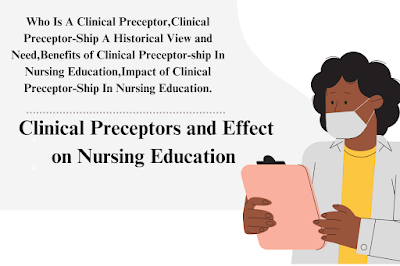The Role of Clinical Preceptor In Nursing Education. Clinical Preceptor In Nursing Education several countries, including Australia, Canada, the United States, the United Kingdom, and the Scandinavian countries (Luhanga et al., 2010).
What Is Role of Clinical Preceptor In Nursing Education
Preceptors play a significant role at both the undergraduate and advanced practice levels. For undergraduate students, preceptors facilitate the synthesis of theoretical knowledge into practical application (Billings & Halstead, 2012). At the advanced practice level, preceptors help students meet specific educational criteria, such as having at least one year of clinical experience, receiving orientation to the educational program requirements, and maintaining ongoing communication with advanced practice faculty (AACN, 2012).
The American Association of Colleges of Nursing (AACN, 2009) recommends that preceptors receive formal mentoring within academic-practice partnerships. Effective preceptorship requires preceptors to understand their role expectations, employ best practices in role modeling, and help socialize students into the nursing profession (Martin, Brewer, & Barr, 2011).
Benefits of Clinical Preceptor-ship in Nursing Education
The one-on-one relationship with a consistent preceptor is crucial for fostering an effective learning environment. This consistent relationship allows preceptors to provide immediate feedback in a safe learning context, promoting student growth (Luhanga et al., 2010). Numerous studies have shown that students frequently report positive experiences with preceptors, noting improvements in knowledge integration, autonomy, confidence, authority, and advocacy skills (Kim, 2007; Rebeschi & Aronson, 2009; Wieland et al., 2007).
- Improved Preparation for Clinical Roles:
Reviews of multiple studies from the 1980s and 1990s suggest that the preceptor model is often equal to, or better than, traditional clinical experiences in preparing students for their roles as nurses (Udlis, 2008). Preceptors enjoy working with students and contributing to the development of future nurses (Raines, 2012). - Institutional Benefits:
The preceptor model offers several advantages to educational institutions, including addressing faculty shortages, reducing the high cost of clinical education, and providing access to clinical expertise (Sedgwick & Harris, 2012). One of the overarching benefits is the development of a stronger relationship between academic institutions and healthcare facilities. Historically, this relationship centered around faculty practice models and research centers, but today, the primary focus is on expanding the nursing workforce with competent and safe practitioners (Beal, 2010).
Impact of Clinical Preceptor-ship in Nursing Education
Clinical preceptors are essential to the success of both graduate and undergraduate nursing students. However, the effectiveness of the preceptor model depends heavily on proper preparation and orientation for preceptors. Inadequate preparation can lead to role ambiguity, conflict, and role overload, which may cause significant stress for the preceptor (McClure & Black, 2013).
Support for Preceptors
Sedgwick and Harris (2012) emphasize that clinical preceptors need adequate financial and educational support to fulfill their roles effectively. Recognition from leadership, faculty, and peers is also crucial in maintaining their motivation and commitment to their responsibilities (Luhanga et al., 2010; Omansky, 2010).
Need for Further Research
Future research should focus on identifying the characteristics, orientation methods, and educational needs of successful preceptors. Such research could help develop better support structures and training programs to enhance the effectiveness of preceptor programs (Martin et al., 2011; Udlis, 2008).
Conclusion
Clinical preceptors play a pivotal role in nursing education, bridging the gap between theoretical learning and practical application. The preceptor model provides invaluable opportunities for nursing students to develop clinical skills, critical thinking, and professional behaviors in a supportive environment. With the right preparation, support, and recognition, clinical preceptors can significantly impact nursing education, fostering the next generation of competent and compassionate nurses. As the healthcare landscape continues to evolve, the role of clinical preceptors will remain vital in ensuring the quality of nursing education and practice.
Read More:
https://nurseseducator.com/didactic-and-dialectic-teaching-rationale-for-team-based-learning/
https://nurseseducator.com/high-fidelity-simulation-use-in-nursing-education/
First NCLEX Exam Center In Pakistan From Lahore (Mall of Lahore) to the Global Nursing
Categories of Journals: W, X, Y and Z Category Journal In Nursing Education
AI in Healthcare Content Creation: A Double-Edged Sword and Scary
Social Links:
https://www.facebook.com/nurseseducator/
https://www.instagram.com/nurseseducator/

I am extremely impressed with your writing skills and also with the layout in your weblog. Is that this a paid subject or did you customize it your self? Either way keep up the nice quality writing, it’s rare to see a nice weblog like this one today!